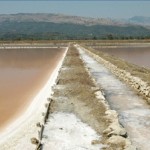 (Podgorica, 20 December 2011) – The pending sale of the “Bajo Sekulić” Saltworks in Montenegro is simply the latest in a series of steps enabling businessman Veselin Barović – and his Eurofond investment vehicle – to reap enormous profits. With the start of bankruptcy proceedings, following the “loss” of a concession for salt exploitation this year, all of the necessary preconditions for bankrupting the firm and then selling it for profit were created.
(Podgorica, 20 December 2011) – The pending sale of the “Bajo Sekulić” Saltworks in Montenegro is simply the latest in a series of steps enabling businessman Veselin Barović – and his Eurofond investment vehicle – to reap enormous profits. With the start of bankruptcy proceedings, following the “loss” of a concession for salt exploitation this year, all of the necessary preconditions for bankrupting the firm and then selling it for profit were created.
The purchase of factories simply for the value of their land and property is a specificity of the Montenegrin model of privatization. The results of this model are visible for all to see: on the one hand, hundreds of workers left jobless and a landscape of destroyed factories; on the other, enormous profits for the owners of enterprises privatized in this way.
Nevertheless, the foundations for this scenario were already established in 2008, when the Parliament of Montenegro adopted a new national Spatial Plan. The Plan re-zoned the grounds of the Ulcinj Saltworks into land designated for tourist accommodations. With this move – and the paltry 800,000 euros that Barović paid for the purchase of the entire “Bajo Sekulić” Saltworks – he was able to appropriate lands worth some 1.5-billion euros for his own speculative goals.
It is worth noting that 2008 marked the peak of the construction boom in Montenegro and property values had jumped to 100 euros / m2.
That year, during the preparation of the national Spatial Plan, MANS warned the public of the probable fate that would await the Ulcinj Saltworks as a result of such re-zoning. It was already clear then that the new spatial plan was designed to meet the needs of the construction lobby and private speculators. Similarly, we pointed out that the conversion of the saltworks into land designated for construction wasn’t the most sustainable policy for the conserving this unique space. In fact, only Barović and Eurofond would stand to gain from the re-zoning.
In the initial version of the Spatial Plan, presented for public consultation, the area of the saltworks was defined as a “monument to nature” and proposals were made to place the region under greater protection by designating it as a regional park or reserve. According to the final report on the public consultations regarding the Spatial Plan, drafted by the Ministry of the Economy, there were no registered objections to granting protected status to the Ulcinj saltworks being voiced. This is a geographic area whose unique ecology is recognized for its importance even outside of Montenegro.
However, even though no public objections were recorded by the cabinet of then Minister of Economy Branimir Gvozdenović, the private objections of some seem to have made their way into the finalized version of the law.
In the proposed Spatial Plan that the government submitted to the Parliament all references to a “monument of nature” were removed. Instead, the government claimed that such a designation would be included in a separate law and within local urban planning documents. The suggested Plan instead recommended that the industrial zone of the saltworks be converted into tourism accommodation facilities, i.e. transforming the property of the Saltworks into lands earmarked for property development. In this way, and for a very low price, Barović became the owner of the largest potential construction site in Montenegro. This enables him to accumulate millions of euros in profits through its eventual re-sale.
The Parliament of Montenegro has the power and the responsibility to maintain the public interest with its actions. MANS will begin communicating with interested party caucuses in order to amend the portions of the national Spatial Plan that effectively sealed the destiny of the Ulcinj Saltworks.



